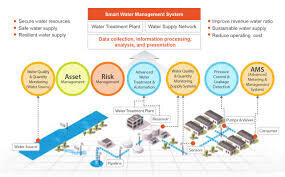Smart Water Management leverages advanced technologies, particularly artificial intelligence (AI), to enhance the efficiency and sustainability of water resources and infrastructure. This approach integrates smart water meters, connected sensors, and predictive analytics to optimize water distribution, monitor quality, and conserve resources.
Role of AI in Water Management
AI plays a crucial role in transforming traditional water management systems into smart, efficient frameworks. By utilizing machine learning algorithms and big data analytics, water utilities can analyze vast amounts of data related to weather patterns, consumption trends, and infrastructure conditions. This enables accurate predictions of water demand and timely responses to potential issues like leaks or quality degradation[1][3].
Key Applications
-
Predictive Analytics: AI algorithms analyze historical and real-time data to forecast water demand, allowing utilities to allocate resources effectively and prevent shortages[5].
-
Leak Detection: Smart sensors combined with AI can identify anomalies in water flow, enabling early detection of leaks. This reduces water wastage and minimizes repair costs[4][5].
-
Water Quality Monitoring: AI systems continuously monitor water quality parameters, detecting contaminants and pollutants in real-time. This ensures safe drinking water and protects ecosystems[4][5].
-
Optimized Irrigation: In agriculture, AI-driven systems adjust irrigation practices based on soil moisture levels and weather conditions, promoting efficient water use and enhancing crop yields[5].
-
Smart Water Grids: Intelligent distribution systems utilize AI to dynamically manage water flow and pressure, ensuring efficient delivery and reducing energy consumption in pumping stations[5].
Benefits of Smart Water Management
The integration of AI in water management systems offers numerous benefits:
-
Efficiency: Real-time monitoring and adaptive control optimize water distribution, reducing losses and improving service delivery[4].
-
Cost Savings: Predictive maintenance and leak detection lead to significant cost reductions by preventing infrastructure failures and minimizing water loss[5].
-
Environmental Conservation: Smart water management practices help preserve ecosystems by reducing over-extraction and pollution[5].
-
Data-Driven Decision Making: AI empowers water authorities with actionable insights, enhancing long-term planning and resource allocation[5].
-
Resilience to Climate Change: By adapting to changing weather patterns, AI enhances the resilience of water management systems, ensuring sustainable water supply in the face of climate challenges[5].
In conclusion, the adoption of AI in smart water management is revolutionizing how water resources are monitored and utilized. By employing technologies such as smart meters and connected sensors, utilities can achieve greater efficiency and sustainability, addressing global water scarcity challenges effectively[1][3][4].
Further Reading
1. https://www.adb.org/sites/default/files/publication/614891/artificial-intelligence-smart-water-management-systems.pdf
2. Using Artificial Intelligence for Smart Water Management Systems | Asian Development Bank
3. Exploring the rise of AI-based smart water management systems | Journal of Water Supply: Research and Technology-Aqua | IWA Publishing
4. Water AI: 8 Ways AI in Water Management Creates a Better Future
5. AI for Water Management: Smart Solutions for Conservation


